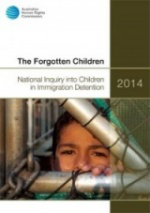Australia: SVP welcomes report on refugee children in detention

The St Vincent De Paul Society National Council of Australia has welcomed a report by the Australian Human Rights Commission (AHRC) on refugee children held in detention. Australia currently holds about 800 children in mandatory closed immigration detention for indefinite periods, with no pathway to protection or settlement. This includes 186 children detained on Nauru. Children and their families have been held on the mainland and on Christmas Island for, on average, one year and two months. More than 167 babies have been born in detention within the last 24 months.
SVP Chief Executive, Dr John Falzon said: “The mandatory detention of children and adults, be it onshore, in Australia’s offshore detention centres, or in facilities overseas that we fund, is one of the most shameful and damaging policies successive governments have inflicted on people. The practice offends even the minimum standards of human decency.
“The evidence that immigration detention causes severe suffering, specifically with regards to mental health issues, is overwhelming. The AHRC report recommends all children and families in detention in Australia and Nauru be released into the community in the next four weeks and for all Christmas Island detention facilities to be closed,”
Dr Falzon said. “We also support AHRC’s call for a Royal Commission to examine the long term impacts on the physical and mental health of children immigration detention.”
National President, Anthony Thornton said: “Our volunteers and members work primarily with children from refugee backgrounds who are already in the community. In this environment, we see the long-term psychological impact that detention has had. However, we have also witnessed some of that treatment directly in detention facilities themselves.
“What our experience has shown us, and what is borne out by a weight of evidence, is that immigration detention is deeply harmful to asylum seekers, and particularly to children. These young people are already very vulnerable, and the conditions in detention cause permanent psychological damage,” Mr Thornton said.
The St Vincent de Paul Society was one of more than 200 organisations and individuals to make a submission to the Inquiry in May 2014. The Society’s submission called for an immediate end to mandatory detention and outlined why refugee children arrive in Australian territory as some of the world’s most vulnerable people.
The Society said the children were:
Politically vulnerable: these children often have a well-founded fear of persecution in their own state.
Socially vulnerable: they have had to leave behind their communities, their schools, their extended families, and often also members of their immediate families.
Economically vulnerable: they have left behind their homes and their belongings. They have rarely been entitled to any economic rights in the transit countries they have passed through to reach Australia (for example Malaysia or Indonesia)
Physically vulnerable: some have been tortured, many are malnourished. Their physical liberty in detention is minimal.
And Psychologically vulnerable: they have faced discrimination, persecution and exclusion in their own home country and, likely, in the transitory countries they have travelled through.
Read the AHRC report here: www.humanrights.gov.au/our-work/asylum-seekers-and refugees/publications/forgotten-children-national-inquiry-children















